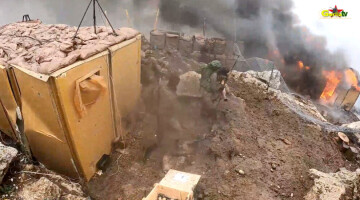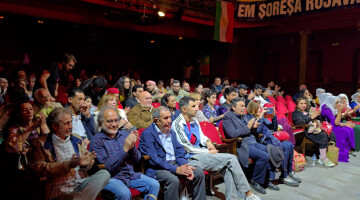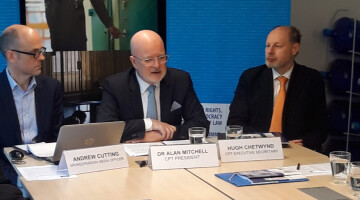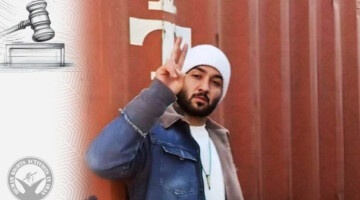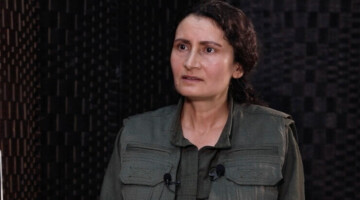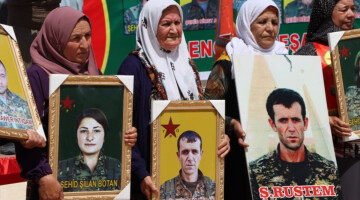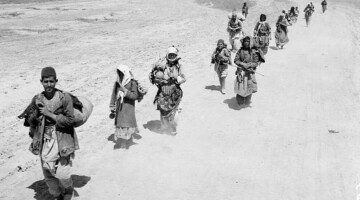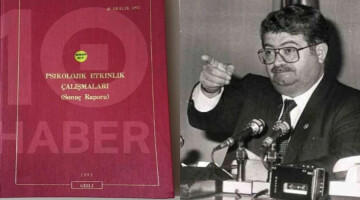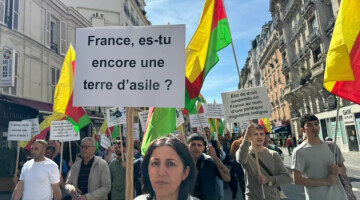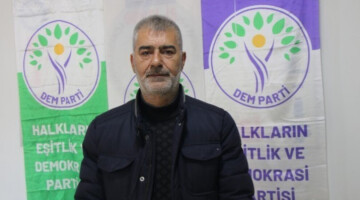Revolutionary Armed Forces of Colombia -People's Army (FARC-EP) Commander Alexandra Nariño and member of the Delegation of Peace spoke to ANF about the current situation in talks with the government of Colombia.
Nariño put emphasis on the difference between terrorism and a struggle for political and social reasons supported by a a broad social base, and the need for a mutual political will of two sides for a process of negotiation.
What is the current situation regarding the peace talks between your movement and the Colombian state?
The talks are going on. We have already spent almost three years in dialogues, there have been made partial agreements on Comprehensive Agricultural Development, Political Participation, and Illicit Drugs. There have been significant advances in the subject of Victims and “Ending the Conflict”. The conversations are ongoing, in recent days two important agreements have been made within the framework of the subject of “Victims”. One was on the subject of justice, and the other on the issue of the disappeared.
How many people is your delegation of peace participating in the talks composed of? What were the titles of the negotiation?
The delegation is composed of thirty female and male guerrillas which we relieve according to the needs and performance of tasks. The topics of the Agenda are: Agricultural Development, Rural Integration, Political Participation, An end to the Conflict, Illicit Drugs, Victims and the last point is the Verification, Implementation and Legalization of the agreements. This agenda was established during the exploratory talks by the government and the FARC-EP, which lasted a year and a half. The government formed its own delegation, and we formed our own.
Of the titles that you have negotiated, has there ever been a situation such as abandonment or loosening?
These talks are held as a result of the fact that there are no winners or losers militarily, and there always exists the need to reach a consensus. We said "We didn't come to Havana to make a revolution at The Table. We want you to let us participate in politics without being killed, and to build a New Colombia in a peaceful way". It is clear that between the two sides, there is an antagonistic contradiction; a contradiction of class. It causes disagreements, and sometimes tensions or temporary breaks, for example the government wanted to implement its vision through unilateral decisions, above all when it comes to justice. Our answer to the government was; "We are not here because we are defeated, we are here because we believe in peace with social justice, therefore you can not come and impose things on us. You need to come to an agreement with us".
If I remember correctly, there were cops, soldiers and other public officials in the hands of your movement. And there were guerrillas, supporters etc. in the hands of the state. What was the situation of these people during the peace process?
At this time, all the prisoners that were in the hands of the insurgency, have been released already. Those who were caught in recent months were released immediately, as was the case of General Alzate and several other public officials.
The government has been more uncompromising in this regard: there are about 1500 prisoners of the movement in prisons of the state, in subhuman conditions. In addition, there are still 9.500 political prisoners in the state jails. We are recently talking about improving the situations, that is torture, overcrowding and neglect in health. Obviously, in the case of a peace agreement, the government should enable an amnesty.
What was the role of the Colombian left and civil society organizations in this process?
The Government has opposed from the beginning to the participation of the social and political organizations in this process, they wanted the talks to be a closed and private process, which we, however, rejected. We told the government that peace can not be built only between two parties, and that it is civilians who have most suffered the consequences of this conflict. They thus started to understand us even a little. Civil society organizations have participated the open sessions and forums here in Havana upon the proposals conveyed through internet. Their participation was a key issue.
Upon the recent developments, it is said that the FARC-EP will lay down arms next year, in the period of April-May of 2016. What will happen with the situation of the guerrillas in the event of disarmament?
At this time we are building proposals against that topic, we believe that our situation is of concern to all. What we do of course, is that we continue to be a cohesive political movement working for a better future for Colombia. That is to say, we don't think that after more than half a century of struggle, the solution should be that each one will go back home. We (will) continue to be a political movement and build; this time, it will just be without arms.
Some movements of the left in Turkey and the world assessed the handshake of Commander Timoleón Jiménez with Juan Manuel Santos and disarmament of FARC as a "surrender". In these assessments stands out a lot more the message that you gave after the murder of the Commander Alfonso Cano. What can you say about these comments and evaluations?
As the FARC-EP, we started our armed struggle not because we believe that the taking up arms is the best or the most revolutionary way to do politics. We began the armed struggle because it was imposed by the repression and violence of the regime. From the beginning, peace has been one of our flags. Our strategic plan was to have ourselves recognised and gain strength through either military or political way. I can say that we succeeded in that, more or less. In addition, we can't talk about a betrayal to the people if we are part of them. A folk will rise up with arms if they are left with no other option. It is obvious that the Colombian people have suffered so much from this war and they are calling for peace. If we turned a deaf ear to their scream, we would not be the People's Army but an army of military-dictatorship.
How do the guerrillas get prepared for this process? What is their perspective with regards to laying down arms?
We have done hundreds of proposals to achieve a democratization of the country. We designed and published each proposed point of the agenda so that the country and the people can see which is what we want, what we seek. In the face of an imposition for disarmament, we are clear that we will not lay down arms, which is another concept. If there remain no threats on our lives, well, we may stop using the arms and turn back to the former position.
In case you were able to follow much, there was "a process of resolution" that continued for 2 years in Turkey between PKK and the Turkish State. This process collapsed completely on July 24 with the initiation of a concept of war on the part of the Government. Why do you think the process between PKK and the Turkish government has ended?
A process of negotiation requires the political will of the two parts. The Turkish government treated the process as a surrender on the side of the PKK, and therefore imposed itself on the PKK. The Turkish government hasn't understood the difference between terrorism and a struggle for political and social reasons, supported by a a broad social base.
All the guerrilla, social and political movements of any country must seek their own destiny. You can learn from other processes, but you can never practice a literal case because dynamics could be similar but do bear differences. Kurds know fully the needs, aspirations and the longings of their people, and feel it in their hearts. PKK will continue acting on this basis.
I would finally like to ask you how it feels to have peace talks with someone that became a President by claiming to end FARC-EP and uttered a threat 'surrender, you will otherwise all end up in grave' after the murder of Commander Alfonso Cano?
The reality demonstrates that there is another alternative, which is participation in politics and the battle of ideas and social justice. How does it feel? Optimism, the desire to move forward, continue to build the country. Our Commander Alfonso Cano was a man convinced of the need for peace. We know that we are in compliance with his will and that gives us incredible confidence.

